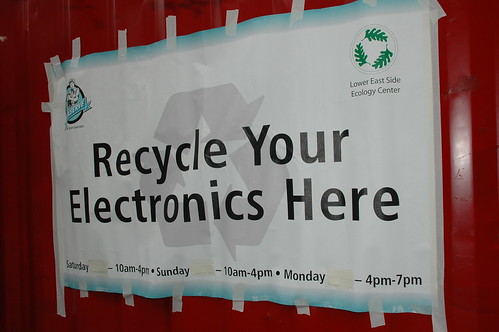Last week I was invited to sit in on a meeting of the Environmental Subcommittee of Manhattan Community Board 3, which represents several downtown neighborhoods including the East Village, Lower East Side and Chinatown. This district is home to a plethora of innovative environmental organizations and their founders, including Christina Datz-Romero of Lower East Side Ecology Center and Wendy Brawer of GreenMaps, amongst many others. The area is also a longtime hotbed of community gardening activity that continues to thrive, despite rampant gentrification and its accompanying pressure to develop once-abandoned lots that are now beautiful public green spaces.
A focal point of this meeting was the City Council’s recently passed (and subsequently modified) legislation to mandate electronics recycling in New York City, the Bill Formerly Known As Intro 104A (now Intros 728 and 729). Lower East Side Ecology Center has been doing community-based electronics recycling since 2002 (including last year’s event on Cortelyou Road which Sustainable Flatbush co-sponsored), and Christina Datz-Romero is one of the more knowledgeable minds on this topic. Her explanation of the bill(s) clarified several points for me:
• This type of legislation is called “Extended Producer Responsibility”, meaning that companies “which manufacture, import and/or sell products and packaging, are required to be financially or physically responsible for such products after their useful life.” To put it another way, it would establish “accountability over the entire life cycle of products and packaging introduced on the market.” (Wikipedia) The more direct terminology is “Polluter Pays”.
• Legislation such as that being proposed for New York City has already been enacted in Minnesota and New Jersey. (I knew that it has existed for several years in Europe, resulting in more environmentally responsible design and manufacturing practices — for the EU market.)
• Enforcement of manufacturers’ recycling rates would be based on retail sales data.
• Computers refurbished and distributed by manufacturers to low-income New Yorkers would receive double credits toward the recycling requirements.
• Intro 104A was introduced by Brooklyn (!) Councilmember Bill deBlasio and overwhelmingly passed in February. But after Mayor Bloomberg stated that he would veto the bill and refuse to enforce it if passed over his veto, an agreement was reached last week to split it into two parts: Intro 728 requires manufacturers to establish free take-back programs by next July, and the Mayor has agreed to sign this into law; Intro 729 establishes “enforceable collections standards”, with increasingly larger targets for the amounts of e-waste recycled and larger fines for noncompliance. It is this second bill which Bloomberg still objects to.
Now, surely the Mayor realizes that Dell, Apple, et al are not going to devote large amounts of R&D resources to improving the toxicity of their products solely out of Niceness. Presumably our own Department of Sanitation would not bother handing out tickets to building owners for recycling violations if they thought everyone would improve their recycling habits voluntarily… why on Earth should corporations be any different?

photo by Flatbush Gardener
A Few More Points to Consider:
A major portion of New York City’s trash is currently transported (via polluting diesel trucks) to incinerators in Newark, New Jersey. Electronic waste in the garbage releases toxins into the air when incinerated, which make their way back to New York City via prevailing westerly winds. The remainder of the city’s staggering amount of solid waste is transported (via, you guessed it, polluting diesel trucks) to landfills out of state. Due to rapidly declining space in these landfills, and the rising cost of transporting our waste TO them, if New York City doesn’t increase its recycling rates (of ALL recyclables, including e-waste), we will be forced to return to local incineration of our trash. The health implications of this would be disastrous. So, make no mistake, recycling is not just a Nice Thing To Do… it is rapidly becoming a crucial component of our waste management and general health policy. (An article from yesterday’s NY Times illustrates the challenges New Jersey is facing to achieve recycling goals originally set for the year 2000.) To make recycling work on the scale needed will require two things: MAJOR increase in public awareness and diligence (and yes, enforcement)… and MORE, NOT LESS, application of Extended Producer Responsibility legislation.